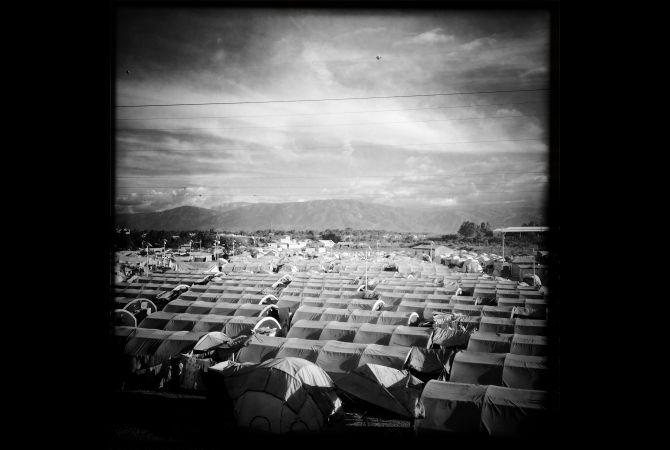Seeking truth in the ‘NGO republic’
Where did all the money go?
The question rises up from the dust of the still-crowded tent camps and the mud of still-impassable roads and from desperate parents still struggling to feed their children.
Two years after the 7.0-magnitude earthquake that ravaged Haiti, less than half of the $3 billion the US has committed to rebuilding the country has actually been disbursed. Reconstruction is by just about all accounts taking far too long. Why?
Haiti is a place of unanswered questions, and perhaps unanswerable questions.
But in this GlobalPost Special Report, correspondent Donovan Webster and photographer Ron Haviv set out on a journey through Haiti to find as many answers to this question as they could. Or at least to hear the questions that Haitians are asking of their own country and of the many donors who have promised more than they delivered.
Webster and Haviv found that some reconstruction efforts are succeeding while others are failing. Most of all, they found resiliency and resourcefulness among the people. But they also found cynicism about an aid effort that seems to be enriching big non-governmental organizations (NGOs.) Haitians now call their country "the republic of NGOs.”
The images Haviv captured are searing and complex and in these images there are truths — if not exactly answers to the big question.
A young man caught stealing a bag of rice is held at gunpoint by soldiers.
A girl looks out warily from behind the tarpaulin flap of a tent in one of the sprawling camps.
A proud fish farmer who is making good with a small grant holds up a single tilapia framed against a Biblical sky.
A shiny new Toyota Land Cruiser, the status symbol for the big-money NGO crowd, weaves through rubble-strewn streets where Haitians wait in the mud for jitneys.
Haviv, an award-winning photographer who is with GlobalPost’s editorial partner the VII Photo Agency, has made more than 30 trips to Haiti over the last 20 years documenting conflict and coups and corruption and disaster. He was there on the ground in the immediate aftermath of the earthquake.
“After each episode I was always wondering how can the Haitians stay positive? How can they think about a better future for their children? Even now, as they try to regroup two years later, the ever-present resilience seems often more to be an attempt just to survive day by day,” he said.
“With the international eye no longer on them, donors and NGOs moving on, the Haitians need to step up more so now then ever before,” he adds. “But now two years later I look at Haiti at another crossroads unsure of which way to turn.”
Webster, a magazine writer for Vanity Fair and the New Yorker and doing his first project with GlobalPost, agreed with Haviv about the unique character of the Haitian people, saying, “There is a resiliency to the people that is incredible. Amazing what they do with the limited resources they have.”
This four-part story by Webster with an accompanying photo essay by Haviv is the start of a continuing series by GlobalPost focusing on Haiti’s reconstruction effort.
They are joined in the reporting by correspondent Jacob Kushner who is based in Haiti and who is looking into the constant finger-pointing in all directions by Haitian politicians, the U.S. government and the NGOs about the failures of the reconstruction effort.
And GlobalPost correspondent Mildrade Cherfils provides her take on the Haitian diaspora. Cherfils was born in Haiti, lives in Paris, worked in Miami and hails from Boston. She knows the Haitian diaspora and its story well and as she reported on the churches and the community organizations all working to do everything they can to help, she heard one question over and over again: Where does all the money go?
It’s a question we plan to keep asking.
This story is presented by The GroundTruth Project.
The story you just read is accessible and free to all because thousands of listeners and readers contribute to our nonprofit newsroom. We go deep to bring you the human-centered international reporting that you know you can trust. To do this work and to do it well, we rely on the support of our listeners. If you appreciated our coverage this year, if there was a story that made you pause or a song that moved you, would you consider making a gift to sustain our work through 2024 and beyond?
